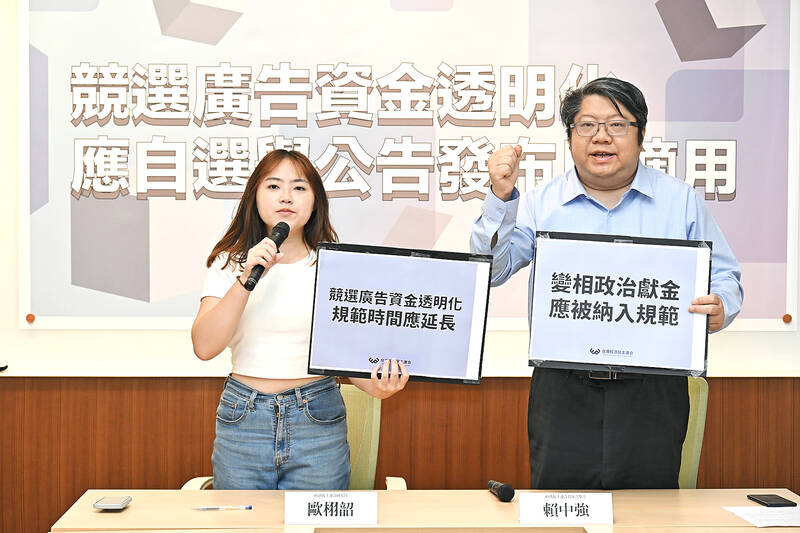The Economic Democracy Union yesterday called for stronger legal measures to counter electoral interference and to bolster campaign transparency, after the government introduced a draft law on election advertising earlier this month.
Taiwan’s currently effective and proposed election laws contain a number of loopholes that weaken their potential to protect election integrity, union researcher Ou Hsu-shao (歐栩韶) told a news conference held by the think tank at the Legislative Yuan in Taipei.
A draft bill about election advertising proposed by the Central Election Commission on Sept. 5 implies that its application starts from 28 days before presidential elections and 10 days before legislative elections, potentially creating a large window of opportunity for meddling, she said, adding that China’s Taiwan Affairs Office or the Beijing-backed Association of Taiwan Investment Enterprises on the Mainland could be involved in Taiwanese elections up to the final stages of political campaigns, before the application of the bill.

Photo: Tu Chien-jung, Taipei Times
The draft should be amended to state that its regulations enter into effect immediately following the election bulletin’s posting, she said.
Provisions in the Public Officials Election and Recall Act (公職人員選舉罷免法) do not have such a short period of applicability, Ou added.
Taiwan’s campaign contribution laws require only electoral candidates and political parties to register donations and establish a special bank account for campaigning, think tank convener Lai Chung-chiang (賴中強) said, citing the Political Donations Act (政治獻金法).
The government is not authorized to regulate funds by a third party that are utilized for election activities or advertising, he said, adding that political action pacts are already an important source of funding for Taiwanese politicians.
In addition, the law should be amended to include financial disclosure requirements for financiers and organizers of campaign activities and influencers on social media, Lai said.
Public relations and advertising agencies should be subjected to the same regulations as traditional media outlets, if they are involved in political campaigns, he said.
Such agencies should be required to disclose their employer or the sources of funding in the absence of an employer, Lai said.

Taiwan has received more than US$70 million in royalties as of the end of last year from developing the F-16V jet as countries worldwide purchase or upgrade to this popular model, government and military officials said on Saturday. Taiwan funded the development of the F-16V jet and ended up the sole investor as other countries withdrew from the program. Now the F-16V is increasingly popular and countries must pay Taiwan a percentage in royalties when they purchase new F-16V aircraft or upgrade older F-16 models. The next five years are expected to be the peak for these royalties, with Taiwan potentially earning

STAY IN YOUR LANE: As the US and Israel attack Iran, the ministry has warned China not to overstep by including Taiwanese citizens in its evacuation orders The Ministry of Foreign Affairs (MOFA) yesterday rebuked a statement by China’s embassy in Israel that it would evacuate Taiwanese holders of Chinese travel documents from Israel amid the latter’s escalating conflict with Iran. Tensions have risen across the Middle East in the wake of US and Israeli airstrikes on Iran beginning Saturday. China subsequently issued an evacuation notice for its citizens. In a news release, the Chinese embassy in Israel said holders of “Taiwan compatriot permits (台胞證)” issued to Taiwanese nationals by Chinese authorities for travel to China — could register for evacuation to Egypt. In Taipei, the ministry yesterday said Taiwan

Taiwan is awaiting official notification from the US regarding the status of the Agreement on Reciprocal Trade (ART) after the US Supreme Court ruled US President Donald Trump's global tariffs unconstitutional. Speaking to reporters before a legislative hearing today, Premier Cho Jung-tai (卓榮泰) said that Taiwan's negotiation team remains focused on ensuring that the bilateral trade deal remains intact despite the legal challenge to Trump's tariff policy. "The US has pledged to notify its trade partners once the subsequent administrative and legal processes are finalized, and that certainly includes Taiwan," Cho said when asked about opposition parties’ doubts that the ART was

If China chose to invade Taiwan tomorrow, it would only have to sever three undersea fiber-optic cable clusters to cause a data blackout, Jason Hsu (許毓仁), a senior fellow at the Hudson Institute and former Chinese Nationalist Party (KMT) legislator, told a US security panel yesterday. In a Taiwan contingency, cable disruption would be one of the earliest preinvasion actions and the signal that escalation had begun, he said, adding that Taiwan’s current cable repair capabilities are insufficient. The US-China Economic and Security Review Commission (USCC) yesterday held a hearing on US-China Competition Under the Sea, with Hsu speaking on